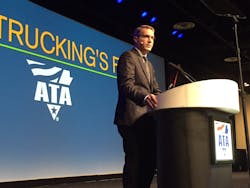ORLANDO. The time for fighting over the electronic logging device (ELD) mandate is over, and the trucking industry should instead focus on uniting over other critical issues, said Chris Spear, president and CEO of American Trucking Associations (ATA).
“This issue has been legislated, promulgated, and litigated. And it is now time to move forward. ELD technology removes one’s ability to exceed the legal hours of service, ushering in a safe, efficient, and fair playing field for the nations’ trucking industry,” Spear said during his “state of the industry” address at the 2017 ATA Management Conference & Exhibition (MC&E).
This was Spear’s second MC&E since taking over as president during the summer of 2016. He used this year’s speech both to tout ATA’s accomplishments, including the several high-profile events with President Trump, but also to warn that the industry must “stop talking about problems and start addressing them.”
Most notably is the driver shortage, which topped the list of the industry’s most critical issues in a new survey conducted by the American Transportation Research Institute (ATRI).
Spear called for the establishment of apprenticeship training programs, and for allowing the hiring of those aged 18-21 more easily into the industry.
“We need interstate recognition of credentials, entry-level training standards for veterans and non-veteran employees, solutions for the impact of detention time and congestion on drivers’ hours of service,” Spear said.
Just prior to Spear’s speech, Labor Secretary Alexander Acosta told MC&E attendees that expanding apprenticeship programs was a priority of the Trump administration.
He said these programs give young people an education and real-life skills in industries where there are available jobs.
Acosta said the Trump administration does not plan to “micro-manage” apprenticeship programs from Washington - it wants to support quality programs industry leaders develop on their own.
Beyond drivers, Spear highlighted ATA’s efforts in backing Trump’s $1 trillion infrastructure proposal. The association earlier this year created a task force that continues to meet with administration and congressional officials as the proposal takes shape, Spear said.
Similarly, Spear noted ATA was involved in supporting Trumps’ tax reform plan, which he called “historic and conventional.”
During Acosta’s remarks, he outlined the plan Trump first laid out in a speech to truckers in Pennsylvania earlier this month. Acosta said lower tax rates and simplifying the tax code would help fleets create new jobs and invest in more new equipment.
As for Spear, he said ATA is moving on to other battles, including the meal-and-rest break dispute in California.
Spear said the issue “involves the state’s duplicative meal-and-rest breaks that collide with federal safety standards, causing drivers to park their equipment in undesignated places, endangering themselves and the motoring public.”
Making health care more affordable, improving driver training, and eliminating redundant drug testing requirements were a few of the long list of items cited by Spear on federation’s agenda. He also said trucking cannot let other transportation modes shape policy on autonomous vehicles.
“Innovation is happening whether we like it or not. Conforming innovation to the benefit of our industry and our drivers is key,” he said.
On the state level, he said ATA was “flanking our federation leaders wherever battles need to be fought.”
Spear ended his speech with a plea for unity on these issues, saying “it makes us strong. It gives us a powerful, more amplified voice. And that will only continue if we come together.”
About the Author
Neil Abt
Neil Abt is a former FleetOwner editor who wrote for the publication from 2017 to 2020. He was editorial director from 2018 to 2020.
